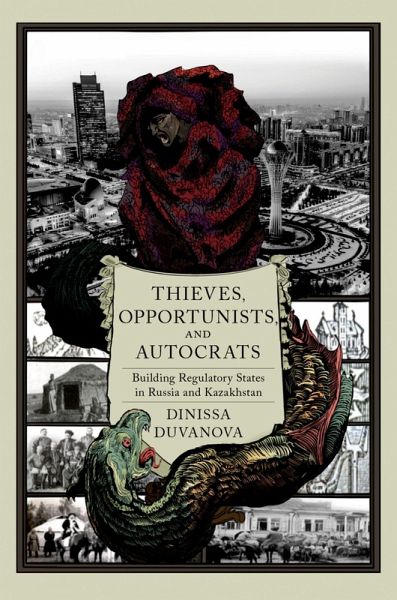
Thieves, Opportunists, and Autocrats (eBook, PDF)
Building Regulatory States in Russia and Kazakhstan
Versandkostenfrei!
Sofort per Download lieferbar
14,95 €
inkl. MwSt.
Weitere Ausgaben:

PAYBACK Punkte
7 °P sammeln!
This book examines how Russia and Kazakhstan navigated the dilemmas associated with building regulatory state institutions on the ruins of the Soviet command and control system. The two nations developed predatory and wasteful crony capitalism but still improved their business climates and economic performance. To better understand these seemingly incompatible outcomes, the book advances a theory of authoritarian regulatory statehood. It argues that politicians use institutions of the state as a means to balance conflicting elite demands for economic rents and popular demands for public goods ...
This book examines how Russia and Kazakhstan navigated the dilemmas associated with building regulatory state institutions on the ruins of the Soviet command and control system. The two nations developed predatory and wasteful crony capitalism but still improved their business climates and economic performance. To better understand these seemingly incompatible outcomes, the book advances a theory of authoritarian regulatory statehood. It argues that politicians use institutions of the state as a means to balance conflicting elite demands for economic rents and popular demands for public goods and economic growth. An effective balancing of the two prevents elite subversion and popular revolt in the short run and ensures elites' continued access to economic rents in the long run. Empirical analysis of nearly a million national and regional regulatory documents enacted in Russia and Kazakhstan between 1990 and 2020 shows that formal regulatory institutions the autocrats built have a profound effect on economic outcomes. Moreover, at times of political vulnerability, autocracies use formal regulatory mechanisms to discipline state agencies responsible for policy implementation. By reducing capricious policy implementation by the regulatory bureaucracy, autocrats are able to reinvigorate economic performance and rebalance elite and popular interests. The theoretical argument advanced in the book links the use of institutional instruments of policy implementation to the political survival strategy. This study effectively shows that regulatory state building has emerged as an effective tool for strengthening autocratic regimes and enhancing their long-term survival.
Dieser Download kann aus rechtlichen Gründen nur mit Rechnungsadresse in A, B, BG, CY, CZ, D, DK, EW, E, FIN, F, GR, HR, H, IRL, I, LT, L, LR, M, NL, PL, P, R, S, SLO, SK ausgeliefert werden.













